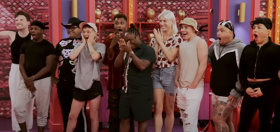
On Thursday, the seven justices of the Supreme Court of California will convene in San Francisco for a three-hour hearing to decide the fate of Proposition 8, which outlawed gay marriage in California after the Court found in May that denying marriage to gays and lesbians amounted to a denial of a “fundamental right.”
It’s hard to diminish the importance of this hearing, not just for gays and lesbians, but for civil rights groups and minorities everywhere. California’s court is the most watched and emulated in the nation. The decisions and reasoning it makes are often applied in courts from coast to coast. In this week’s hearing, the Court will decide not just the immediate future of gay and lesbian marriage in California, but whether civil rights can be stripped from a minority by a simple majority vote.
Leading the charge to overturn Prop. 8 is the National Center for Lesbian Rights. Its legal director, Shannon Minter, will be the first attorney to present his case, our case, to the Court on Thursday. Throughout this week, Queerty will be your first source for news, analysis and in-depth stories on this landmark and historic hearing. We begin today by speaking with NCLR Executive Director Kate Kendall on the game plan they have for Thursday’s hearing.
QUEERTY: All eyes are on California, where the NCLR’s Shanon Minter will be doing much of the arguing in the Supreme Court case this week. What’s the game plan?
How about we take this to the next level?
Our newsletter is like a refreshing cocktail (or mocktail) of LGBTQ+ entertainment and pop culture, served up with a side of eye-candy.

Kate Kendall:The court hearing is obviously a really extensive one. It will be at least three hours. That’s the time the court has allotted. Those challenging Prop. 8 will go first. Shannon Minter is our legal director at NCLR. He is arguing first.
What is the argument you’re making?
What we are arguing – and I think you’ll see slightly different perspectives from all those who argue in support of invalidating Prop. 8 – is that it really represents an unprecedented exercise of majority power and a very dangerous exercise. For the first time ever, Prop. 8 represents a situation where the rights of a minority group were able to be stripped away by a simple majority vote.
One doesn’t need to be a voracious student of history; you only have to understand some of our history in passing to know that if the majority were permitted to vote on past, key questions of civil rights and individual rights in this country, we would have been set back a great deal on race issues, on criminal justice issues on reproductive rights issues on women’s rights. And yet, that’s what we’re facing here.
So what we’re asking the court to do is recognize what a monumental change Prop. 8 is to our Constitution, and that such a significant structural reordering of how the law protects people under the Constitution can not be achieved by a simple initiative vote at the ballot box. Instead, it must go through what is a revision process that is prescribed under the Constitution, so that a proposed revision goes to the Legislature first and, if it wins 2/3’s majority, it then is referred to the ballot for the electorate to vote on. It is that process that is a part of Constitution that we argue should have been followed with Prop. 8.
Attorney General Jerry Brown’s argument is a little wider. It’s that essentially arguing that denying gay people marriage is wrong and that it’s a fundamental right. Do you see these two arguments, his and NCLR’s, as being complimentary?
Yes. The Attorney General’s argument is exactly as you characterize it. It is a more broad argument. It is a more general argument founded in general principles of how the Constitution should operate. It’s really an argument that only the Attorney General could make. The Attorney General is charged with defending the Constitution and, in his role, he is uniquely positioned to say what he said in his pleadings, which is that Prop 8 is so fundamentally counter to the most basic understanding of how the Constitution operates that it simply can’t be upheld as a proper amendment.
Our argument is more specific one. His a more general one, but both make the same point: That if Prop. 8 is allowed to stand, it will be a blow to the foundation of how constitutional law operates.
Has NCLR and the Attorney General’s office discussed the arguments?
I’m sure. I’m sure that Shannon, our legal director, has had numerous conversations with Chris Krueger, who is the attorney who will be arguing from the AG’s office.
What do you think is the biggest challenge facing the coalition opposing Prop. 8 that will come from Ken Starr’s argument?
I think the argument that our opponents will make is twofold—and it’s the argument they’ve made all along. The first is that Prop. 8 only restores the “traditional” (their words) definition of marriage and that it does not deny a fundamental right or undermine equal protection. And even if it did do that, undermine equal protection, that is something that the voters are perfectly entitled to do.
The original Supreme Court ruling that allowed gay marriage in California called it a “fundamental right.” Now the same people are being asked to, it seems, rule on that issue again. Do you have any sense of where the court is on this issue?
I don’t. It’s notoriously difficult to try to figure out or guess how a court is going to come out on any particular case. Certainly, if they uphold Prop. 8 there’s no question that undermines their previous landmark ruling in the marriage cases. That would be, I think, a very disappointing outcome. Not just for those of us who support full equality but really for the role of the court itself.
However, this is an unprecedented situation, and it’s always harder for a court to make a ruling in a controversial case of first impression – a case which has never been presented to it before – then in questions that are more familiar. So, it’s a tough call how the court may come out and there are certain ways we think that our argument is right and legally correct and sound and certainly correct as a matter of justice. But obviously, these seven justices will be making the final call on that.
There are marches and rallies planned next week. What should gay people be doing right now?
Well, I think—we’re not a part of any of the rallies that are being organized, because obviously, we have a specific role to play, but I do think it’s very important for our community and allies to stand in solidarity, opposed to Prop. 8. To certainly attend rallies or activities if community members are interested– but just as important is to have private and personal conversations with neighbors, friends, co-workers, family members, to write letters to the editor, to write letters to your church newsletter or your school newspaper or newsletter, talking about how important it is that the court strike down Prop. 8 and the threat Prop. 8 poses to any minority rights.
The reason we have such a broad array of support from our friend of the court briefs for invalidating Prop. 8, more briefs than that have been filed in any case, ever, before the California Supreme Court is that everyone understands in the labor, business and civil rights community how dangerous Prop. 8 is for California, and for other minority groups.




















fern
It seems to me that this case has nothing to do with gay or justice or what people might think justice is. It will be very technical and based on philosophy of law, history of law and custom law, even the Justices and all the lawyers involved do not know the outcome, it will be more like a “spectacula” where gladiators are going to fight it out and some are going to bite the dust. The only thing I can say is that all people heteros alike who want equal rights will hope with all their heart that proposition 8 is thrown out.
Disgusted American
One of the saddest things about all this besides the blatant discrimination in CA:
..around $$70Million dollars was spent on this to prevent LGBT Americans from having the RIGHT to marry…$$70 million? Money that could have went to the GROWING Homelessness in CA….the 1000’s on LA’s SKID row…to food banks, to subvert poverty..? But, NO….somehow Religious Organizations thought it was more important to keep consenting adults from committed relationships???…hmmm…? Im not religious..but I gotta’ wonder…what would Jesus spend that money on…? I think we ALL know that answer!!!!
Kurt
I don’t think people really get the repercussions that will follow this case. California is 20% or 1/5 of the population of the United States. To legalize same-sex marriage here would be a huge step in legalizing it all over the country. No matter how many States oppose it now. This is an exciting time in our state’s history.
fern
@Disgusted American:disgusted I hear you and have made that point on different forums. Having been brought up hetero I have an outsider’s view like proposition 8 was the greatest thing that could happen in America in the sense that it brought a new awareness to the people who support equal rights.
Another thing is that I do not like gay pride parades when I say this many gay people go after me although Cleve Jones is in the same opinion, my point is that it doesn’t project a good image of the gay community, from the hetero’s point of view they’ll never believe that some gays are top notch lawyers, doctors, and very responsible people, GLBT people seem to forget about history and the how’s and why’s the Stonewall incident made their very existence possible. Then when I found out that the poor and uneducated (of which I am one) voted Yes I knew why and one of these reasons is that the Christians are involved in helping the poor and never forget to indoctrinate them. Why doesn’t the GLBT do the same and instead of saying “we give because Jesus told us to give” they could say “we give because our community is important to us”.
kevin (not that one)
California is the most populous state in the US and in the top 10 largest economies in the world. 1 in every 8 Americans live in California, so the outcome will definitely affect the marriage equality movement.
I will be praying for a favorable outcome, but just in case it’s not we should prepare for a ballot initiative for 2010. I don’t believe the LGBT community will let this issue die on March 5th, whatever the decision is.
All of us have to be more engaged. We are a minority, which means we have to work even harder against the right-wing onslaught against us.
Whether you are in a relationship or not, whether you are LGBT or a straight ally, we can no longer be on the fence on this issue. It’s equal rights, or no rights – and unfortunately it is now that black and white. They will take away rights from us if we let them.
atdleft
@kevin (not that one): Definitely agreed, Kevin! No matter what the court does, we must be prepared. In fact, here’s a good place to start…
http://www.couragecampaign.org/equalityhub
We need to get up, get vocal, and get active. I truly believe we can undo Prop H8 in a short amount of time… IF WE COME OUT & SPEAK OUT!
atdleft
@fern: We are, Fern. At least where I’m at in Orange County, our local LGBT groups and progressive ally coalitions are thinking all the time about “pay it forward” actions and what we can do to help others in our community. Unfortunately, that doesn’t get publicized as often as the “gays going wild at pride parties!” stories.
Still, I see your point and I hope more LGBT organizations think more about how to win others over by way of kindness & charity.
Flex
@fern: You have a skewed view of reality, and are too stupid to vote on the liberties that effect our private lives!
Chitown Kev
@atdleft:
And we need to do it all over the country. It’s been easy to sit on the sidelines, for the most part, and dismiss it as a California issue. (Oh, it’s California, of course they won’t ban gay marriage…I thought that. Not anymore.) While there are ways in which this fight is pecuilar to all sorts of dynamics in California, the principle of equal rights for all must stand.
fern
@Flex: Seeing things from a different angle may just make the difference between success and failure, and you calling me stupid just shows the quality person you are.
Aaron
@fern: The gay doctors and lawyers are too busying being doctors and lawyers to bother with those parades. I’m gay and live in San Francisco and I’ve never been to a pride event. They seem to attract the lowest common denominator, people who just want to get drunk and be annoying, much like any parade or sporting event, etc. Those parades are not at all represetative of gay and lesbian people. They’re represetative of people who want to party.
Chitown Kev
Can we not break out into a class war here please? These religious nuts don’t simply want to take away our right to marry or to march in a parade, they ultimately want to exterminate us, period. We don’t have time for all these differences.
Miss Understood
I always hate all of this grumbling about Gay Pride Marches, especially from people who have never been to one. I have been to many. They are generally about 80% community and social organizations, young and old, all races, all sizes. Of course the more colorful people get photographed. Who the hell wants to take a photo of someone in a suit or in jeans and a t-shirt. If I go to any parade or festival, whether it’s St Patricks or Caribbean day, I want to be entertained. You don’t hear Jamaicans complaining that people in feather costumes make them look bad.
Chris
@Kurt:
CA is about 12% of the US population but point taken.
kevin (not that one)
@Aaron: If you’ve never been to a pride event, how do you know of that which you speak?
I go to the Pride Parade every year and have marched in it several times in the past 15 years. I find it very spirtually satisfying and an amazing visual representation of the universality of the LGBT rights struggle.
There are all sorts of people represented and, in general, everyone is friendly and happy to be there.
Maybe you considered hundreds of LGBT families and their children, along with the many religious groups and community service orgs, to be lowest common denominators as well?
I’d be happy to attend a Pride Parade with you, so long as you leave that negative attitude at home.
kevin (not that one)
@Aaron: “people who just want to get drunk and be annoying”
By the way, I’m clean and sober and I attend the Pride Parade and surrounding events. I can’t offer an opinion of whether I’m annoying or not…I’m generally low-key.
Chitown Kev
@kevin (not that one):
So am I! Some years I go, some years I don’t.
strumpetwindsock
@Aaron:
I can appreciate your reticence. I knew someone who didn’t like to attend because he thought the term “queer” was demeaning and self-hateful.
But it’s a lot more than drinking and partying – it’s a show of solidarity and a chance to make connections – business, political and personal. Even if you’re not into the celebration it’s probably the most public event where our opponents get to see that we are here and not ever going away.
For that reason alone, it deserves our support even if you personally have problems with taking part.
Pragmatist
I think there needs to be a slight correction to the article. This week, the Supreme Court is hearing oral arguments from all sides, as part of its decision-making process. This hearing will not “decide … the immediate future of gay and lesbian marriages in California….”
Rather, it will provide an opportunity for both sides to be heard, for the judges to clarify the parties’ respective positions, and (perhaps most centrally) to put on a bit of pomp and circumstance for the citizens of California.
The actual judgment won’t come for another three months, and it will be the product of undocumented negotiations between the justices.
MadProfessah
The actual amount of money spent on Proposition 8 is about 83 million (at least)!
Jaroslaw
And it shouldn’t take three months to determine (A) this is a sweeping thing and per California’s own rules, it should have gone through the legislature first before going to the popular vote and (B) if the popular will of the people trumps everything, then what are the limits on WHAT (rights/issues) can be voted on and what CANNOT be voted on! and (C) Gay people are people, the courts have already determined we’re a suspect class historically – why allow discrimination? You marry the (ONE) person of your choice and I do the same!
Forrest
I would hope that the court would take into consideration the intense interest in this case and not drag out the decision. Hopefully we will know early this month.
Chitown Kev
@Forrest:
March, April, June…Pride Month. Wasn’t it like that when the Supreme Court rendered Lawrence. Yeah, I would rather it be over sooner than later but…wow, what a Pride Month if they overturn in June…
fern
I never said anything against the gay parade. I just said it didn’t project a very serious image of the gay movement, thence making it very easy for a “good Christian” to say that freaks don’t deserve the same rights. I’m not making a judgment on anything I never did and am not about to start I’m talking about an image like that school witnessing a gay wedding, while it would have been a nice thing to do in Mass. it was the worst thing to do in SF and it happened the Christian right used and abused it, these people are ruthless and will use anything to put you down. The Roman Catholics hate the Mormons and the Protestants, I remember with JFK “can a Roman Catholic become president of the United States?”, yet these three denominations allied themselves against the GBLT. it seems to me the fight here hasn’t much to do with homosexuality and is more a show of power of the churches against the secular state, look at Pakistan the government is helpless against the religion, in Iran religion is the government and if you can’t see that, well I wish you good luck and btw the U.S. refused to sign the UN chart decriminalizing homosexuality along with Iran were they hang them.
Chitown Kev
@fern:
you are rather late on the news, Bush didn’t sign on to the UN Declaration but Obama did, though the UN measure still failed.
Forrest
@fern: Disparaging differences within the GLBT community is ignorant and demeaning. Especially when we are fighting against forces that use the same tactics. No one forces you to go Pride parades. I think they represent the great mix our extended family. Not much different from the wide variety of groups that march in Mardi Gras and many other festive events of all cultures.
LittleLeslie
@fern:
What I find is that most pride festival’s are full of respectable attendees, but that media only pics up on the extreme. I took a friend to St Louis Pride, she noticed “everyone looks like regular people.” Of course! But the local newspaper showed a guy with crazy hair and a snake around his neck. Regular folks don’t make news, and so the public doesn’t get a good representation.
Ignore Flex. It’s sad when people feel the need to be rude. We have a long way to go in listening to other perspectives. We have to get rid of “us vs. them” mentality. I understand when fellow gays get angry, but it just creates a greater divide and accomplishes nothing towards gaining equal rights.
Stacey
Being rather slow on coming out, I only went to my first Pride parade last year, in Boston. It was celebratory, fun, and the crowd was diverse and it wasn’t just a bunch of drunk people. Our governor actually marched in the parade. The majority of the parade participants were community and civic groups. Sure there were floats for the local gay bars with go go boys dancing and drag queens but it definitely wasn’t some hedonistic free-for-all. The most outrageous thing I saw was some flashing of tits for all of about 2 seconds. Given all the bitching and moaning about Pride parades that I’ve seen in some places online, I was expecting something perhaps a little more crazy. It was actually just a nice, fun celebration of the community.
It’s too bad some people seem to think that all pride events are just a bunch of drunk, horny, outrageous queers making the community look bad because from my (admittedly) limited experience that’s just not true.
flucht17
@chitown kev
may.
Chitown Kev
@flucht17:
I did forget May but it would still take it into June if they took the full 90 days, that may depend on how broad or narrow the Cali Supremes wants to address and answer the questions before them.
Sebbe
@Japhy – Excellent article and interview. I look forward to your coverage this week. I would just suggest one clarification, the California State Supreme Court is likely the most watched and emulated in the nation in regards to the state court system. One could conceivably argue that the United States Court of Appeals for the District of Columbia Circuit is the most watched court in the nation though, specifically for those that follow legal news. Half of the current supreme court sat on that court.
@fern – You are right in regards to your first comment, this is a legal issue the court is deciding in their eyes (as it should be), nothing more or less. They are interpreting the constitution of the State of California. Encouraging is how they have previously ruled of course.
@Pragmatist – You are right, do not expect a quick decision, possible that it won’t be three months, but I have actually heard people who thought we would know this week. NO WAY
@Forrest – Possible, but unlikely, especially within a month. In regards to pride, I agree. I at one point when I was very young thought they weren’t for me, until I experienced them and saw you can get out of it what you want. I cried the first one I marched in, and don’t laugh, but I probably had a suit on.
Sebbe
@Stacey – Boston pride is a very nice event!!
Sebbe
@Stacey – depending on the weather of course. LOL
Sebbe
@Japhy – I just re-read the article and listened again to the video. Thank you. Hope you are able to get some great information this week. Are you heading up to San Fran?
DonG90806
The Supreme Court has 90 days to write an opinion which does not become final for another 30 days. Writing an opinion is an extremely time-consuming event. The judge has to back up every thing he says with a prior court decision. Then the opinion has to be circulated to all the other judges. If another judge wants to change a sentence or a paragraph, then the decision has to recirculate. It takes a long time to get to the final decision.
Don
fern
@LittleLeslie: This is the point I saw it a couple of times on TV and the juiciest parts were shown, so if you don’t know any better what can your opinion be?
As for the poor and uneducated, the church is involved with them at many different levels, so when I was 11 some kids took me to some Catholic scouts thing and after that I became an altar boy, the church also teaches you to accept your fate as God’s will, so when the powers that be repress you you say thank you and ask for more. I didn’t buy that and at 13 I was slowly on my way to become the atheist I am now. I also knew about gay bashing and all those who bragged about it were cowards just like those who beat on women.
Your fight is dear to me if it were not I wouldn’t spend my two cents on it.
fern
@Chitown Kev: Your point here is irrelevant Had McCain won it still would be unsigned.
@Forrest:
“Disparaging differences within the GLBT community is ignorant and demeaning.” I am not doing any such thing and had you read with more attention you might have noticed that it was more about perception or semiotics than disparaging. As for parades I never felt good in a crowd so I avoid them, heck I won’t enter a bar when it looks overcrowded but that doesn’t mean I don’t like to party.
fern
@LittleLeslie:
Thank you and let me tell you had I been gay and 40 years younger in California I probably would have thrown bricks at the churches, as I did with some draft dodgers against the war in Vietnam on a US consulate. I’m not sure wisdom comes with age, but I think a lot more than I did then.
Mister C
Regardless of all of our FRICK AND FRACK here with each other. Lets just all HOPE the best can be fulfilled for us!
THIS TIME!
fern
@Mister C: You’re right about that.
Forrest
@fern: Whatever. You clearly believe others in the GLBT community that have different interests and likes than you make you look “bad” and should be closeted. That’s your problem.
Regarding Prop 8, I have no legal background but fear that Prop 8 will not be invalidated. And in an attempt to look “balanced” the Court will not void the existing marriages. Try to make everyone somewhat unhappy instead of making the truly fair decision.
Chitown Kev
@fern:
But the point is did Obama win and the US did sign on to the UN Declaration. To be sure it’s a symbolic and not a substantive gesture but symbols are important, nevertheless.
Mark Boston
people both gay and non gay who are homophobic and use the Pride Parade as a tool to illustrate homosexual behavior are CLASSIC cherry picking just as the religious extremists do when picking out passages in the book to push their hate. Pride is simply a celebration , a party.. one needs to look no further than images from ANY heterosexual spring break event OR Fat Tuesday (anywhere in the world) OR Mummers day parade ,and so on and so on , to see drunkenness , nudity, men wearing feathers, and questionable good taste . Once again the Gays are being held to completely different standards compared to the non gays
fern
My apologies!
Am I sorry I mentioned the gay parade. People love parades all sorts of parades one can go from the extreme left to the extreme right and they all love parades.
My point was the image it projects to some people and the use being made of the gay parade by the churches and consorts, and should be taken as such. LittleLeslie comforted my opinion stating that the media takes the more extreme pics.
You and I are wasting our time in debating the relevancy of parades and I certainly would not want to create a wedge within the GLBT movement. Unity is required here and we all know too well that if prop 8 is overturned it won’t take long for the fed level to go along which is what I want.
If I knew all it took was for me to dress in feathers with a tutu to overturn prop 8 I would do it.
Mark
No matter how this turns out, never forget precisely what the Mormon church did. They spent $70M to PREVENT people from having rights.
This is the legacy of worshiping an invisible Jewish sky god. Invisible, being the key word. Oh, and don’t forget the charlatan who MADE UP the Mormon religion. Completely. Made. It. Up.
Now, those people who were duped by a charlatan – and who believe in invisible daddies – are sh*tting on us.
This is America? Our laws allow this?
Justice is still not done. Apparently, it’s never done.
fern
@Forrest:
It seems you were right about the decision of the court.
My perception in this debate is that all of the justices favor the no on 8 side and Starr didn’t get any sympathy from the court. Unfortunately the right the Californians have on voting by referendum or ballot seem to be the center of the debate. If the court decide to simply overturn prop 8 it will devaluate the power of the people and their vote, and this is something nobody wants.The ending when Starr told the court he was ready to answer many more questions, the answer sounded more like (to me): “no we got enough of your shit”. I really had the feeling that all the Justices truly are against prop 8 and it will be tough on them to come up with a solution.
@Mark: Religion is important to many people, when I twisted my ankle I also needed a crutch, the evil and danger of religions lies with its leaders the example being Pakistan where the religious leaders are wrestling the power out of a democratically elected government, one of the pope said it clearly once that the Vatican was no democracy. Our problems started in AD 325 when emperor Constantin gave power to the Christians, I guess the lions were fed up with them too.
Let’s hope for the best and btw your marriage will be recognized in Belgium and the Netherlands.
Sebbe
@fern – While I hope you win in California. It is going to be close. Try and observe this case with a little more objectivity I know it is hard. It is not a case at this point of what is right and wrong. It is a legal question. I do not believe anyone looking at this objectively as well could believe that all the justices are on our side even ethically, never mind legally.
Best of luck to you on the West Coast.
fern
@Sebbe:
I think you got something wrong there. I am a French speaking Belgian, it is also the second country in the world to have adopted gay marriage right after the Netherlands for which I am proud. I am well traveled geographically, socially and intellectually, my career goes from reform school to partying at the home of the president for Chrysler Europe. I have no intention of returning to the U.S. just because of the ban on smokers, I missed the vigils and demonstration with the no on 8 but I might end up fighting non smoker gay people. As for objectivity….
Gabou
It is sad to realize California has so many incompetents as Supreme Court judges. That stupid Justice Kennard doesn’t seem to understand any kind of logic in regard of the equality clause and the protection of minorities. That’s where you are now, USA, with that kind of idiot to protect your fundamental rights. Next thing you’ll know, you’ll be going back to illegalize interracial marriages in the name of your fairy tale you call God.
fern
@Gabou:
Just be patient and don’t call anybody stupid. Read Nr. 36 and what Dong has written, if the justices were all closeted gays their decision has to go along the lines and rules that go beyond the understanding of most of us, me included. We can only hope for the best. The most important thing is to keep on fighting and not give up. Something good is that the U.K. prime minister unleashed against proposition 8 in a public speech, I also have a google alert and each time prop 8 is mentioned I get an e-mail and whenever I run into a Christian wipe I give them my two cents.